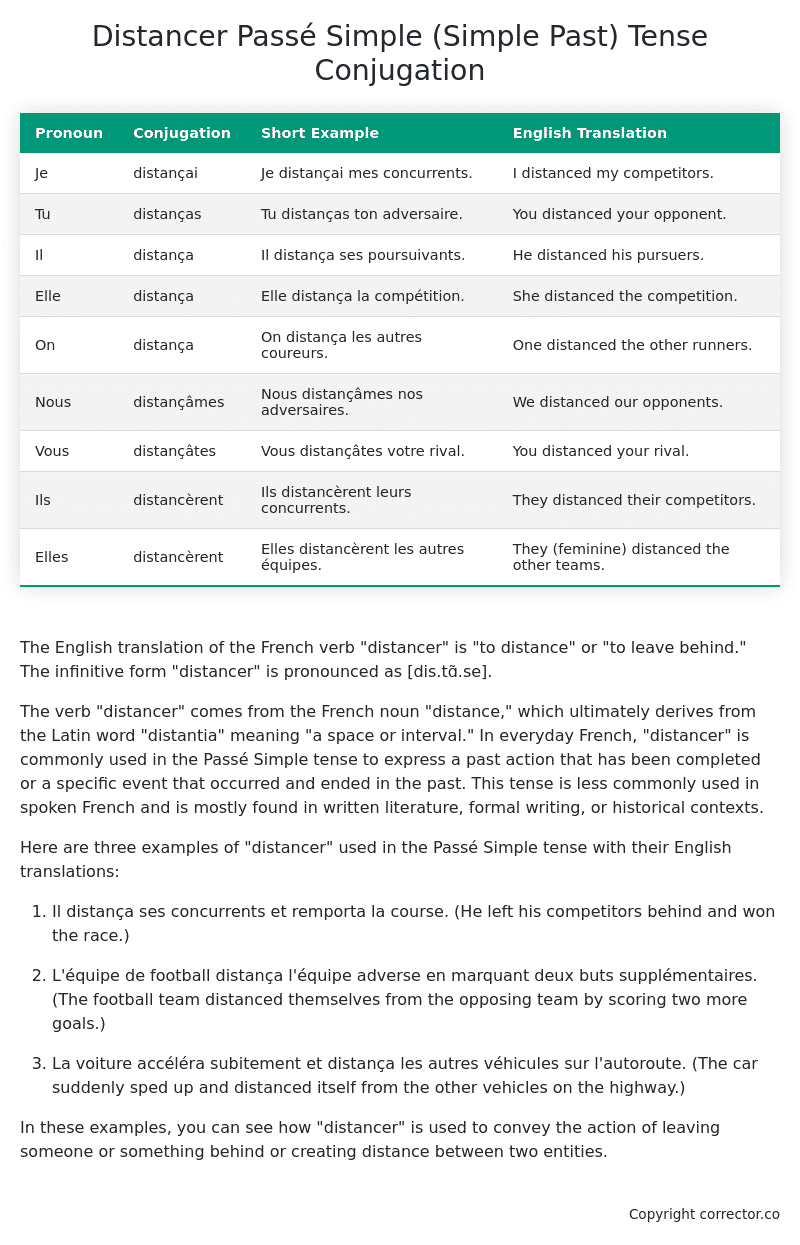Passé Simple (Simple Past) Tense Conjugation of the French Verb distancer
Introduction to the verb distancer
The English translation of the French verb “distancer” is “to distance” or “to leave behind.” The infinitive form “distancer” is pronounced as [dis.tɑ̃.se].
The verb “distancer” comes from the French noun “distance,” which ultimately derives from the Latin word “distantia” meaning “a space or interval.” In everyday French, “distancer” is commonly used in the Passé Simple tense to express a past action that has been completed or a specific event that occurred and ended in the past. This tense is less commonly used in spoken French and is mostly found in written literature, formal writing, or historical contexts.
Here are three examples of “distancer” used in the Passé Simple tense with their English translations:
-
Il distança ses concurrents et remporta la course.
(He left his competitors behind and won the race.) -
L’équipe de football distança l’équipe adverse en marquant deux buts supplémentaires.
(The football team distanced themselves from the opposing team by scoring two more goals.) -
La voiture accéléra subitement et distança les autres véhicules sur l’autoroute.
(The car suddenly sped up and distanced itself from the other vehicles on the highway.)
In these examples, you can see how “distancer” is used to convey the action of leaving someone or something behind or creating distance between two entities.
Table of the Passé Simple (Simple Past) Tense Conjugation of distancer
| Pronoun | Conjugation | Short Example | English Translation |
|---|---|---|---|
| Je | distançai | Je distançai mes concurrents. | I distanced my competitors. |
| Tu | distanças | Tu distanças ton adversaire. | You distanced your opponent. |
| Il | distança | Il distança ses poursuivants. | He distanced his pursuers. |
| Elle | distança | Elle distança la compétition. | She distanced the competition. |
| On | distança | On distança les autres coureurs. | One distanced the other runners. |
| Nous | distançâmes | Nous distançâmes nos adversaires. | We distanced our opponents. |
| Vous | distançâtes | Vous distançâtes votre rival. | You distanced your rival. |
| Ils | distancèrent | Ils distancèrent leurs concurrents. | They distanced their competitors. |
| Elles | distancèrent | Elles distancèrent les autres équipes. | They (feminine) distanced the other teams. |
Other Conjugations for Distancer.
Le Present (Present Tense) Conjugation of the French Verb distancer
Imparfait (Imperfect) Tense Conjugation of the French Verb distancer
Passé Simple (Simple Past) Tense Conjugation of the French Verb distancer (You’re reading it right now!)
Passé Composé (Present Perfect) Tense Conjugation of the French Verb distancer
Futur Simple (Simple Future) Tense Conjugation of the French Verb distancer
Futur Proche (Near Future) Tense Conjugation of the French Verb distancer
Plus-que-parfait (Pluperfect) Tense Conjugation of the French Verb distancer
Passé Antérieur (Past Anterior) Tense Conjugation of the French Verb distancer
Futur Antérieur (Future Anterior) Tense Conjugation of the French Verb distancer
Subjonctif Présent (Subjunctive Present) Tense Conjugation of the French Verb distancer
Subjonctif Passé (Subjunctive Past) Tense Conjugation of the French Verb distancer
Subjonctif Imparfait (Subjunctive Imperfect) Tense Conjugation of the French Verb distancer
Subjonctif Plus-que-parfait (Subjunctive Pluperfect) Tense Conjugation of the French Verb distancer
Conditionnel Présent (Conditional Present) Tense Conjugation of the French Verb distancer
Conditionnel Passé (Conditional Past) Tense Conjugation of the French Verb distancer
Conditionnel Passé II (Conditional Past II) Tense Conjugation of the French Verb distancer
L’impératif Présent (Imperative Present) Tense Conjugation of the French Verb distancer
L’impératif Passé (Imperative Past) Tense Conjugation of the French Verb distancer
L’infinitif Présent (Infinitive Present) Tense Conjugation of the French Verb distancer
L’infinitif Passé (Infinitive Past) Tense Conjugation of the French Verb distancer
Le Participe Présent (Present Participle) Tense Conjugation of the French Verb distancer
Le Participe Passé (Past Participle) Tense Conjugation of the French Verb distancer
Struggling with French verbs or the language in general? Why not use our free French Grammar Checker – no registration required!
Get a FREE Download Study Sheet of this Conjugation 🔥
Simply right click the image below, click “save image” and get your free reference for the distancer Passé Simple tense conjugation!

Distancer – About the French Passé Simple (Simple Past) Tense
Formation
Usage
Narration
Historical Context
Interactions with other tenses
Passé Composé
Imparfait
Conditional and Subjunctive
Summary
I hope you enjoyed this article on the verb distancer. Still in a learning mood? Check out another TOTALLY random French verb conjugation!


